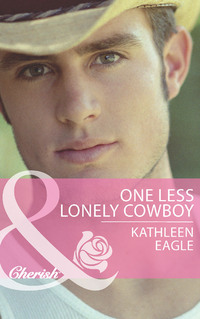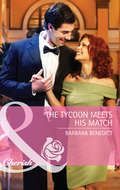Das Buch kann nicht als Datei heruntergeladen werden, kann aber in unserer App oder online auf der Website gelesen werden.
Buch lesen: "One Less Lonely Cowboy"

Jack was looking for something else today—a pretty face, a soft voice, a sassy smile.
Mike’s daughter was the complete package. To hear Mike tell it, his daughter was a fair ranch hand herself, not to mention good student, good teacher, good cook, good mother, good-looking—hell, you could zone out, tune back in and Mike was still talking about Lily.
She’d given him her name, caught his eye, and he’d been damn grateful for the shelter of his hat brim. Felt like he’d touched a live electrical wire. Crazy. First time he’d felt that kind of sensation absent a power source. Unless that’s what she was.
Damn, what was he, sixteen?
Dear Reader,
The hero of my first Mills & Boon® Cherish™ was a rodeo cowboy. I’ve since put dozens of cowboys between the covers of Cherish—bull riders, ropers, horse trainers, ranchers and cowboys for hire. Jack McKenzie is what’s known as a “day worker.” He’s a highly skilled ranch hand who hires out to as many ranchers as he can fit into his schedule.
Times have changed since my husband and I were in the cattle ranching business, and few operations can afford the full-time “hired man.” The small-scale cattleman faces seemingly overwhelming competition from mega ranches. It’s a classic David and Goliath story, and the day worker is one of David’s best allies.
With no shortage of work for an experienced cowboy during calving season, Jack is hard-pressed to devote his time to one aging Montana rancher who’s too stubborn to admit that his health might be failing. But Jack knows what it’s like to be a loner. His sympathy for his boss is only the beginning of this cowboy’s commitment when Mike’s daughter, Lily, reluctantly returns home.
I love writing about cowboys, and I know you love reading about them. I hope you’ll check in with me on Facebook, my website kathleeneagle.com, and my blog, ridingwiththetopdown.wordpress.com. We’ll talk cowboys and Indians, horses and kids and books, books, books.
Happy tales!
Kathleen Eagle
About the Author
KATHLEEN EAGLE published her first book, a Romance Writers of America Golden Heart Award winner, in 1984. Since then, she has published more than forty books, including historical and contemporary, series and single title, earning her nearly every award in the industry. Her books have consistently appeared on regional and national bestseller lists, including the USA TODAY list and the New York Times extended bestseller list.
Kathleen lives in Minnesota with her husband, who is Lakota Sioux. They have three grown children and three lively grandchildren.
One Less
Lonely Cowboy
Kathleen Eagle

MILLS & BOON
Before you start reading, why not sign up?
Thank you for downloading this Mills & Boon book. If you want to hear about exclusive discounts, special offers and competitions, sign up to our email newsletter today!
Or simply visit
Mills & Boon emails are completely free to receive and you can unsubscribe at any time via the link in any email we send you.
For David and Shawna
May you live happily ever after
Chapter One
Iris reminded her mother of a hatchling popping out of its shell. She’d slept through much of western North Dakota, missed crossing the state line, and now she was about to get her first look at her new stomping grounds. Her new airspace. Plenty of air, plenty of space—two more points Lily Reardon could add to the plus side of the next pointless discussion about the move they had to make. It didn’t matter that Iris only bothered with one minus—leaving her friends—against Lily’s multitude of pluses, or that the discussion was no longer a discussion but a fait accompli. It would come up again, mainly because Iris was waking up in more ways than one.
She blinked, head bobbing atop a long, slightly wobbly neck as she emerged from the white folds of her old Minky blanket, still the hatchling for another second, maybe two. Blink, blink. No judgment in the big blue eyes that searched first for assurance that Mommy was nearby. Last year’s Iris. Lily’s little girl.
Then the curtain came down in those eyes.
“Where are we?”
It wasn’t the question that was hard to take; it was the tone. It was like the landscape surrounding the second-hand Chevy that was one missed payment away from getting repossessed: beautifully straightforward and unforgiving. The answer wasn’t important.
“We’re almost there.”
Iris drew a deep breath as she took a look at either side of the two-lane road. Winter had receded from the brown grasslands, but spring wasn’t ready to put up any green shoots. Nights were still too cold, and the sky was still untrustworthy. The beauty would come. They only had to wait a little longer, drive a little farther. But Iris could only know what she was seeing here and now. Montana was Lily’s birthplace. It had narrowly missed being Iris’s.
“I hope there’s a ‘there’ there,” Iris said. “I don’t see any here.”
Lily chuckled. Whether trying her patience or plumbing her trove of trivia, her daughter loved testing her. Being both mother and teacher, Lily lived in double jeopardy.
Lily took the bait. “You know where that comes from, don’t you? ‘There’s no there there’?”
“Gertrude Stein.”
Lily smiled at the road ahead. Point for knowing the answer, extra point for not saying duh. They passed a turn marked by the sign that told Lily they were getting close. Iris had stopped noticing signs the day before, two or three hundred miles back. She’d been asleep when Lily had turned off the road at a truck stop near Dickinson, North Dakota, when she’d started nodding off herself.
“She was talking about California,” Iris said. “Can you imagine?”
“Oakland.”
“Whatever.”
Point docked on Lily’s mental scoreboard. But this wasn’t the time for a tally.
“Cali-freakin’-fornia,” Iris said, as though she knew the place firsthand. “If there’s no ‘there’ there, I quit.”
“Quit what?”
“The journey. Life’s a journey, right? Literally and figuratively both. And this—” Iris made a sweeping gesture toward the brown fields and foothills beyond the windshield. “—is just a layover. Who goes to a place like …” She sucked in the deep breath her dramatic sigh required. “Back to my original question. Where are we?”
“As far west as your thirteen-year journey has taken you so far. We just passed Lowdown, Montana.”
“Who goes to Lowdown, Montana, Mom? Who? Oh, God, we do.” Iris slid back down, tucking her chin into her blanket. “We two, we unhappy two, and we don’t even stop in Lowdown. We drive right through on our way to Bottom Feeder Farm.”
“The Rocking R Ranch.”
Iris groaned. “That is so Roy Rogers, Mom.”
Lily laughed. “And what do you know about Roy Rogers?”
“Enough to beat Rachel Varney at TV trivia. We were running neck and neck until we hit the fifties, and then I—” She slid one palm across the other and whistled through her teeth. “Because I never miss American Pickers on TV.”
“You and your grandfather will get along just fine. He never throws anything away.” Except people, Lily reminded herself. But her quick follow-up reminder—water under the bridge—helped her keep her foot on the gas pedal. Her father would be glad to have them. His words. No qualifiers, no pregnant pauses.
“OMG, speaking of Roy Rogers …” Iris straightened in her seat. Lily chuckled. Iris hadn’t noticed old man Tyree’s fence post boots until they’d passed the first few. Old boots capped steel fence posts along the right of way for at least a mile, kicking their weathered heels at heaven. Iris swung her head back and forth, counting under her breath as they passed each one. Finally she laughed. “Is this what passes for recycling here?”
“I never thought of it that way.” Some of the leather looked like beef jerky. Lily wondered whether her father’s neighbor was kicking up his heels somewhere beyond the big sky. “The exhibit has been growing ever since I can remember. Supposedly the man who lived here started it when he got stuck up to his boot tops during a gully washer and he hung them up there thinking the rain would clean them off.”
“Did it?”
“I don’t even know whether the story’s true.” Lily glanced over at her daughter, hiking her eyebrows. “Could be a rural legend. Think Snopes dot com would have something to say about that?”
“I think it’s called ‘Lies My Mother Told Me.’”
“Oh, come on. Lighten up.”
“You kids with your boots on the ground,” Iris mocked in a crackly voice. “We had to leave ours on the fence post so we didn’t lose them in the mud. We walked to school.” She wagged her forefinger at the windshield. “Twenty miles each way. Barefoot.”
“Only when it rained,” Lily said with a smile.
“Carrying your Roy Rogers lunch boxes, which are now worth more than— Don’t tell me this is it,” Iris said, as Lily flicked the turn signal. The last fence post boot was a speck in the rearview mirror. A break in the four-wire fence was marked by a sparsely graveled approach, a new cattle guard and an old sign. “Mom, there’s nothing here. Just … Omigod, you weren’t kidding. The Rocking R Ranch. Really.”
“Really.”
It was hard to keep a straight face, but Lily had to put forth the effort. Otherwise she wasn’t sure whether her mouth would turn up or down. She hadn’t seen much of her father since she’d left the ranch over thirteen years ago. She’d seen him twice, to be exact, and both times he’d been the one to initiate the contact, and pay his only child and grandchild a visit in Minneapolis. It had been four years since the last visit. She’d told herself she was going to make this trip with Iris one of these days, just as soon as the right day came along. It never had.
Lily wasn’t kidding herself thinking this was the elusive right day. On the right day she would have been at the top of her game, returning on terms of her choosing. If she’d made the time when times were good, this trip might not be so difficult. But she hadn’t. Once she’d lost her job, times had gone from tight to tough to agonizingly tense, but she wouldn’t call for help from her father until she had no other choice. And no home plus no money equaled no other choice.
So here they were, and here, at the very least, was a place to be. The house hadn’t changed—a box with a top—but it promised a roof over their heads, over doors that opened and closed, over quiet rooms with safe beds. It wasn’t home anymore, not since she had walked away carrying Iris inside her. But it was a place to be. Nothing quite like an eviction notice to put a necessity once taken for granted into perspective. All they had now was each other, and Iris would never have less. She would never be alone, certainly not by Lily’s choice. Pride didn’t go down easily, but it did go quietly. For Iris’s sake.
“Does the Rocking R Ranch have wi-fi?” Iris’s voice had lost all its edge, all its humor. Could this be the sound of a thirteen-year-old’s reality setting in?
“I don’t know.” It wasn’t a lie. She didn’t know for sure, and what were the words I doubt it really worth?
“It didn’t occur to me to ask,” Iris said. “Until now. Not that it would have mattered.”
Lily stared straight ahead. They were nearing the place she’d last seen in the rearview mirror of a friend’s pickup. Not a boyfriend’s pickup. The driver hadn’t been the father of her unborn child. Molly Taylor had driven her to Glendive, where she’d boarded a Greyhound bus and headed for Minneapolis, which hadn’t been exactly what Mom had it cracked up to be. Nothing ever was. But it was a place to be until Lily took matters into her own hands and made it more than that. She’d worked her butt off to get her degree and her own place and her teaching position, and she’d almost gotten tenure. Almost. But then she’d lost her job, and she hadn’t been optimistic about the prospect of getting on at another school. You pay your dues so you don’t have to take any more chances. She’d had her standards, her requirements—damn it, she’d earned the right to hold out for more. At the very least for nothing less. Security, maybe?
Okay, subsistence.
How about survival?
She had fought it, cursed it, and finally she’d made her peace with reality. But she wasn’t ready to force the whole reality enchilada on a thirteen-year-old. There had to be some scrap of fantasy left for Iris. Lily couldn’t provide internet, but surely she could come up with something wonderful and wireless.
She pulled the car around back of the house, and there was her something.
“Horses, Iris.” The old barn’s new metal roof glinted in the sun. Two sorrels stood in the small pasture outside the corral, where a man was working a beautiful black-and-white paint on a lunge line. “You’ve always wanted to ride,” Lily said. “Now’s your chance.”
“Oh.” Iris released the buckle on her seat belt as she leaned closer to the windshield. “Hey. That’s not Grandpa.” Closer still. Lily wondered whether it was time for an eye exam. “Mom, who’s the cowboy?”
“No idea.”
“Really? Good.”
Iris got out of the car, shut the door a little harder than necessary and met her mother on the other side. Lily was pretty sure she’d made the entire move without taking her eyes off the corral, not even for the motley-colored dog that darted out from behind the barn growling and then, at a glance from the cowboy, quickly retreated to the fence and sat. Lily glanced back at the cowboy, whose connection with the dog was clearly below the radar.
“Okay, this place is suddenly looking a lot better.” The comment was sotto voce, not that the cowboy seemed to be paying them any mind. “His pants are kinda tight and geeky, but maybe that’s not such a bad thing.”
“They fit.” Lily gave her daughter a who-are-you? look. “Not that it matters.”
Iris squinted, gave a tight smile. “I saw him first.”
“Iris, really.”
“You keep telling me to look on the bright side. I finally found one.” She turned back to the corral. The man was concentrating on his horse. “We should go introduce ourselves.”
“We should go present ourselves to your grandfather. He knows we’re coming, but …” Lily put her arm around her daughter’s shoulders and urged herself by urging Iris toward the back door of the house. “I wasn’t sure exactly when.”
After several knocks the door still stood closed.
“Is it locked?” Iris wanted to know.
“We’ll wait for him to let us in.” Lily could feel the doubt, the disbelief, the adolescent impatience growing on her left flank. Or was it really her own uncertain center, the feel of her tail stuck between her legs? Her head was telling her to get on with it—the first few moments would be the hardest—but the strings to her limbs were tied somehow to the knot in her stomach. She glanced at Iris, who questioned her with a puckered brow.
“You can try it if you want.” With a gesture toward the doorknob, Lily took a step back.
Seriously? the voice in her head scolded.
“He’s your father.” Iris’s frown deepened. “He’s expecting us, isn’t he?”
“Yes, but … I should have called him before we left. Or when we stopped in Fargo, maybe.” Lily gave her head a quick shake. She was making a complete fool of herself. “I don’t know what I was thinking. Trying to time it just right, I guess. After chores, before bed. You don’t want to …” … get him on the phone when he’s been drinking. She turned away from the door and looked elsewhere. “Let’s ask the cowboy.”
“Oh, let’s.”
Iris’s delight was understandable. From a distance the man was promising. He knew what he was doing, and he looked good doing it. Smooth, sure, confident. The horse didn’t question it, and neither did the dog. Lily wanted some of that right now. The confidence, not the man. But the closer they got, the better he looked. His long, lean body, his deft hands, his handsome face all kept faith with the promise he’d shown at a distance. Lily was sure he’d noticed them, but the easy-loping paint had his full attention.
A man who minded his business. Always impressive.
Iris was the first to call out to him. A bold “Hi!” No shrinking violet, her daughter, but Lily sensed a little deflation when the cowboy spared no more than a glance and a nod. She laid her hand on Iris’s shoulder and pressed on. The ball was in Mom’s court now.
“We’re looking for Mike Reardon,” Lily called out as she stepped up on the bottom corral rail and folded her forearms over the top one.
A low-pitched, authoritative “Ho” changed the horse’s pace. The lunge line went slack, and the cowboy finally turned about half his attention to the women. “You came to the right place at the wrong time. He went into town.”
“I’m Lily, Mike’s daughter. He went to Lowdown?”
“I’m Iris, the granddaughter.” She’d scrambled up two corral rails, putting her head and shoulders above her mother.
“Jack McKenzie.” He touched a gloved finger to the brim of his black hat. “The hired hand.”
“Really. Grandpa has a hired hand.” Iris glanced down, grinning at her mother.
What a difference a cowboy made, Lily thought.
“That sounds so cool. Like a real ranch,” Iris added.
“Like Roy Rogers?” Lily teased.
“The Double R Bar. I know my TV trivia.” Iris wasn’t going to let the man go too easily. “What are you hired to do, exactly? Are you like a real cowboy?”
“Iris …”
The cowboy cracked a smile, which changed the whole attitude of his chiseled face, put a spark in his dark eyes and gave his full lips potentially delicious animation. He let the rope slide loosely through his grip as he turned his back to the horse and approached the fence. The line went slack as the horse followed, seemingly of its own volition. “As real as they come these days. I’m all about chasing cows.” He pulled off his right glove and offered Lily a handshake. “Mike talks about you a lot. Does he know you’re coming?”
“I just talked to him a couple of days ago. Yes, he said we should …” She watched him offer Iris the same greeting, and it occurred to her for the first time that the man was American Indian, at least in part. It was the handshake—a brief, warm, easy touch offered to everyone present, adult and child alike.
She glanced up, suddenly anxious. “Is he okay?”
“He’s doing good, yeah. He doesn’t—”
“I know. He says he goes to meetings and all that. Just making sure we aren’t walking into …” Lily clamped down on her tongue. Too much information. The drinking was something she would deal with like an adult. She’d been to a few meetings herself. Adult children of people who shouldn’t have been parents. The group had another name, but that was what it came down to. She gave half a shrug and offered a tight smile. “Making sure nothing’s changed since, you know, he invited us here.”
The cowboy answered her shrug in kind. “I just work here.”
“Of course. I’m sorry. I should have—”
“That’s a great-looking horse,” Iris put in cheerfully. “Is he Grandpa’s?”
Jack grinned. “She’s mine. Mike lets me keep my horses here. The filly’s just getting settled in. Got her out of that wild-horse adoption program down in South Dakota.”
“She’s wild? She doesn’t look wild.”
He laughed. “You can’t tell by looking. Kinda like people.”
“So you can’t ride her?”
“Not yet.”
“What’s her name?”
He turned his smile to his horse, tipped his head as though he expected the answer to come from her. “Yeah, we haven’t quite decided.”
“I’m named for a flower,” Iris said. “So’s Mom.”
“Was that his idea?” Jack nodded toward the house. Iris and Lily turned their heads, following the direction of his gesture and becoming aware of the soundless arrival of the man they’d been looking for. “Hell of a romantic, that guy. Nice flower garden you’ve got here, Mike.”
Parking rules must have changed, Lily thought. Don’t want no vehicle left in the front of the house. The less of our business people can see, the better.
Her father’s appearance registered hard on the heels of that thought. Maybe he walked more quietly than she remembered because he’d lost some weight. But he’d gained a ready smile, and Iris went straight to him.
“A bright spot for sure.” His voice had gone the way of his walk—quieter, a little raspy. But any vigor the years had taken away, the blue eyes that greeted Lily’s made up for with a vibrancy she hadn’t seen before. “Real nice surprise, too,” he said as he accepted Iris’s eager hug in the way of a man who was trying something out that he’d spent much of his life avoiding.
“Surprise?” Lily wasn’t going to compound the awkwardness with more hugging.
“You didn’t say for sure. I mean …” He gave Iris’s back a parting pat. “I’m glad you’re here. Look at this one, will you? You were just …” His leathery hand measured four feet up from the ground. “Maybe less. Growing like a weed.”
“A flower,” Jack said, turning to Iris. “What kind did you say?”
“Iris.”
“Iris and Lily.” He touched a finger to the brim of his hat. “Pleasure.”
“Pleasure?” Iris whispered.
“To meet us,” Lily explained, as they watched the cowboy amble across the corral, the paint homing in on his shoulder and following along like a well-trained dog. She glanced at Iris. She knew cowboys. Had known. One cowboy, anyway. It could be mesmerizing, just watching them walk with fluid, natural ease. “They don’t like to waste words.”
“They? Who’s they, Mom. Don’t tell me you’re being—”
“Men.” Lily chuckled. “Some men. Westerners. Right, Dad?”
“We don’t like to waste anything. We’re conservative. Or conservationists.” He gave Lily an oddly hopeful look. “Which is it, English teacher?”
“I’d say you’re both.” She wasn’t sure what he was hoping for. The opening for a touchy-feely moment between them had come and gone. “I guess I should’ve called again, but I thought you knew we were on our way after you gave us a green light.”
“I was gonna fix up the bedrooms. Yours hasn’t changed since you left.” Mike laid his stiff hand on his granddaughter’s shoulder. “You want your mama’s old room, girl? It’s small, but it’s—”
“Iris, Dad. I’m ‘girl.’ She’s Iris.” Lily tried to exchange a glance with her daughter, but Iris wasn’t doing her part. The cowboy and his horse were more interesting.
Yeah, okay, so maybe they were. But even so, Lily wasn’t letting anyone call Iris girl.
“Haven’t had a girl on the place since you left, and now there’s two. Gonna take some getting used to.”
“We’ll make it easy on you, Dad. I haven’t forgotten how to drive a tractor.”
“You can drive a tractor?” Doubting Iris was back.
“She can, but she won’t have to,” her father said. “Drivin’ tractor’s about all I do lately. Jack takes care of the heavy lifting. If you can still bake that strawberry rhubarb pie you used to make, that’s all I ask.” He winked at his granddaughter. “What’s your specialty, g—Iris?”
Iris laughed. “Guy-ris? How’s that, Mom?” She raked her finger through her strawberry-blond bob. “I’m letting my hair grow out. Does Jack live here?”
“I wish he did.” Mike glanced at the weathered red barn, where the cowboy and his filly had taken refuge. The dog was gone, too. “Jack’s a day worker, and he’s in high demand. I can’t afford him full-time.”
“What’s a day worker?” Iris wanted to know.
“Cowboy for hire. Jack’s a top hand. I let him keep his horses here, and like I said, he takes care of the heavy stuff. That’s where he lives.” Mike pointed to a long white gooseneck trailer, hooked up to a red dually pickup that was parked upwind of the barn.
“Isn’t that for horses?”
“Part of it is.” Mike folded his arms across his narrow chest. “He’s a gypsy, Jack is. That’s his wagon.”
Iris smiled, casting a wistful glance toward the open barn door. “So that’s what Gypsies look like.”
“Jack’s part Chippewa, Cree, something like that. Métis, he calls himself. Mixed-blood. Gotta admit, I never paid much attention to the different tribes around here until Jack came along.”
“I had Native American friends in Minnesota,” Iris said. “That’s not the same as Gypsy.”
“All I know for sure is Jack McKenzie is one hell of a cowboy. Without him, I don’t know … I’d’a been in deep trouble this winter.”
“Is he married or anything?” Iris persisted.
“He ain’t married. Don’t know about anything. He’s got a couple kids up around Wolf Point. Goes up there to visit pretty regular.” Mike’s eyes narrowed in amusement. “You writin’ a book or somethin’?”
“He’s a hottie.” Iris gave her grandfather her recently perfected bug eyes. “Duh.”
“That’s it, Iris. No duh,” Lily said.
“Sorry, Grandpa.” Iris hung her head. Like the blush that followed, the hangdog posture was rare. “It just means, like, obviously,” she explained quietly.
“Hottie, huh?” Mike chuckled. “Like I said, it’s gonna take some getting used to, havin’ girls around.”
Mike helped them carry luggage and a few boxes through the kitchen, down the hall and into the bedrooms. Lily said more was being shipped—she hadn’t been able to fit everything in the car—but what she didn’t say was that she’d sold everything she could. She wasn’t looking forward to the day when the boxes arrived and Iris started missing things. Among other things, her bike had been sold, and all but three of her stuffed animals had gone to the Salvation Army.
Iris had left the apartment each time Lily asked for help sorting their stuff out. She’d been warned. If you leave it to me, you might be sorry later. Lily had been grateful for Iris’s silence on the matter, but she knew her daughter’s denial had been considerably deeper than her own. Sooner or later there would be tears.
It felt strange to haul her suitcase full of women’s clothes to their temporary quarters in the bedroom she’d painted pink and green when she was a teenager. Stranger still, the room hadn’t changed. Her father hadn’t been kidding about that. As much as he’d hated her music, he hadn’t taken her posters down. The Dave Matthews Band, Hootie and the Blowfish, beautiful Gloria Estefan, whose dress was the same shade of pink she’d chosen for her walls. The quilt her grandmother had made—the one she regretted not taking with her—the Breyer horses, the ruffled café curtains, everything looked the same as the day she’d hauled her pregnant self out to Molly’s pickup.
“Wow, Mom, this was you?”
Lily turned to find her daughter standing next to the chest of drawers and holding a silver picture frame. There were more frames on top of the chest. They hadn’t been there before, so she had to step up and take a look. With a nod she acknowledged her high school portrait, even though it was hard for her to recognize the carefree smile on the girl in the picture. Not the way she remembered the time the picture was taken. What had she been doing that day to put that look in her eyes?
“Wow. You were hot.”
Lily laughed. “Duh.”
“Nope. No duh.” Iris set the picture back on the bureau and picked up another one. Lily standing beside Juniper. “Whose horse is this?”
“Mine. Well …” Could she really say that? She’d left the horse, along with everything else in the room. “She was mine then.”
“Beautiful.” Iris set the picture back in its place and turned her attention to the rest of the array. “It’s almost worth it, coming here, just to see what you looked like when you were young.”
“When I was young?” Aloud Lily chuckled, but in her mind she puzzled over the mere fact that the pictures were on display, neatly framed.
“Okay, young-ger. How old were you here?” Iris pointed to a picture of Lily wearing a dress. A rare image for those days.
“About fifteen.”
“I hope I look this good when I’m …” Iris rested her hand on top of a small album. Lily recognized the flowered cover. “Are there any of my father?”
“I don’t know what’s still here, sweetie.” She knew she’d bought that album herself, but she couldn’t remember what she’d put in it.
Iris tapped her fingers on the cover. “You’re gonna let me find out for myself?”
“It’s your room. I didn’t take much with me when I moved out, so it’ll be fun to see what you dig up.”
Fun? Maybe that was pushing it. But oddly enough, the word wasn’t hard to say. It could be fun. The girl in the pictures looked surprisingly happy.
Iris turned to one of two sets of wall shelves her father had put up—grudgingly, as Lily remembered—for her books and other treasures. He’d complained about putting holes in the wall. “What’s all this about?” Iris asked.
“I was in 4-H. State fair competitions, mostly. Different kinds of …” Iris picked up a small silver horse. A big blue ribbon was looped around the base. “That’s for Western Pleasure.”
“‘Grand champion,’” Iris read aloud from the ribbon. She examined more ribbons, all dusty, mostly faded, but the recognition stamped in gold still shown. “First place. Second place. First place.” Grinning broadly, she looked up at her mother. “You got first place in rabbits?”
Lily couldn’t help smiling. “I raised rabbits one summer. Hoppsie and Poppsie.”
“For pets?”
“Well, that’s just it. There’s an auction at the end of the show, and you never know what the buyer will do with your prize animal. Maybe use it for breeding. Maybe for eating.”
“Really?” No more grin.
No “duh.”
“I raised a shoat the next year. You know, a little pig. Grew to be a big pig.” There was probably a picture around somewhere. Lily had half a mind to go looking for it. That was the half that made her smile. “Made a good profit on that guy.”
“What was his name?”
“I learned my lesson about naming 4-H projects. I called him Pig. Grandpa called him Bacon. Said that was a 4-H project he could really sink his teeth into. Threatened to bid on him.”
Die kostenlose Leseprobe ist beendet.








